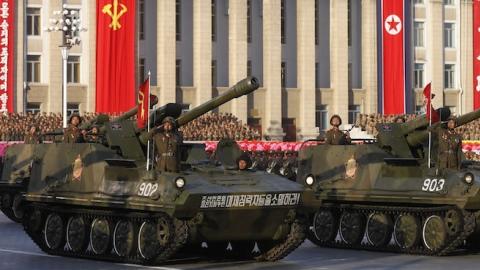Pyongyang, no stranger to provocation, has taken things to the next level. The Financial Times
“The missile appears to have fallen in our exclusive economic zone. It’s an intolerable, reckless action and poses a grave threat to our national security,” said Shinzo Abe, Japan’s prime minister.
Japanese defence officials believe it was the first time a missile has landed in the country’s exclusive economic zone — an area stretching up to 200 nautical miles, or roughly 370km, from a country’s coastline.
The midrange Rodong missile was launched from Eunyul in south-west North Korea early on Wednesday and travelled about 1,000km before crashing into the ocean west of Japan’s Akita prefecture, the officials said.
This latest move will tighten the defense relationships between the U.S., South Korea and Japan, ratchet tensions in Asia another notch or two higher, and put Japan’s rearmament drive on steroids. And given the radical uncertainty that Donald Trump’s remarks on U.S. alliances—and specifically with Japan (which has just appointed a hardline nationalist for defense minister)—have created in the region, this latest missile firing into Japan’s 200 mile economic exclusion zone is more serious and potentially destabilizing than it looks.
It’s never easy to understand what the North Koreans think they are doing at any given moment, but a couple of points do seem clear.
First, the North Koreans are less worried than they were two years ago about the strength of their ties with China. The friction between China and its neighbors and China’s relative isolation in the region make North Korea an indispensable if awkward ally for Beijing. Rather than responding to this with love and gratitude, the North Koreans are using their ability to defy the emerging Pacific Coalition without fear of Chinese punishment to raise their profile.
Second, they must know that their actions are calculated to accelerate the remilitarization of Japan and polarize the region. From Pyongyang’s point of view, that seems to be a good thing. The more tension between China and Japan, the less willing China is to alienate North Korea.
Third, driving South Korea closer to Japan and the U.S. also helps the North Koreans. A couple of years ago, Chinese-South Korean relations were strong and getting better, and there was speculation that Beijing hoped to detach South Korea from its Pacific connections. That was a nightmare for North Korea; good relations between its rival on the Korean peninsula and its patron pose a serious threat to the survival of the Kim dynasty.
Ditto, by the way, when it comes to spoiling relations between the U.S. and China. North Korea wants the two big powers on bad terms—that increases its value to China and lessens the chance that North Korea would be the odd country out in an era of Asian detente.
Given all this, North Korea’s behavior seems understandable and rational from the Kim dynasty viewpoint, but what about China? Is China so paralyzed that it is letting the North Korean tail wag the Chinese dog—or has China decided that a climate of confrontation in the western Pacific, even at the cost of a remilitarizing Japan and a stronger and more cohesive Pacific Coalition, fits better with its interests than any feasible alternative?
None of this is good news. North Korea has decided to up the tension in Northeast Asia, and China is either unwilling or unable to do anything about it. This is probably not the scenario President Obama had in mind when he announced the pivot or as they now say the rebalance toward Asia, but that is where we are.


















